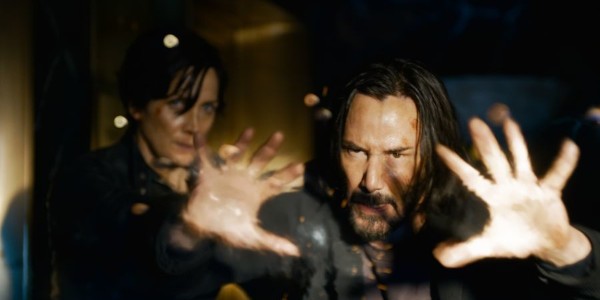“If you don’t know what’s real, you can’t resist.”

The Matrix Resurrections is a 2021 release from Warner Brothers Pictures. It is directed by Lana Wachowski from a story written by Wachowski, Aleksandar Hemon, and David Mitchell. Starring Keanu Reeves, Carrie-Anne Moss, Jessica Henwick, Yahya Abdul-Mateen II, Jonathan Groff, and Neil Patrick Harris, it’s a return to the digitized, cyberpunk world of the Matrix, first delved into in 1999’s The Matrix, and is a direct sequel to 2003’s Matrix Revolutions.
Exploring a modal simulation of Trinity’s (Moss) escape, a weirdly off recreation of the opening of the original Matrix with many of the details altered, Bugs (Henwick) encounters Smitheus, a strange amalgam of Agent Smith and Morpheus. (Abdul-Mateen II) After a scuffle, she red-pills him and liberates his mind from machine oppression. The two return to her original mission, to find and free Neo, (Reeves) who had disappeared from the awareness and knowledge of the human resistance at Zion as a result of the events at the end of the Matrix Revolutions.
Thomas Anderson (Reeves) awakes to find a phone full of messages and the start to another busy day as a lead designer of award-winning video games for Warner Brothers. His last trilogy of titles, his Matrix series broke the mold of what was expected in open-world gaming, and each was an event release, selling millions and millions of copies. Now work has begun on a new IP, Binary, and the pressure is building to see if he can match the success of his earlier work. After a dissociative break and a suicide attempt brought on by the stress of crunching to meet deadlines of the earlier games, Thomas has began to see an Analyst, (Harris) who has prescribed him medication to help him manage his issues.
His boss Smith, (Groff) is a liaison to the suits upstairs and while quoting dialogue from Anderson’s previous titles, he spurs an episode where Thomas has trouble discerning what is real. This isn’t helped at all by the flamboyant arrival of Smitheus, who approaches Anderson in the bathroom after appearing and apperating through the looking glass. He begs for Neo’s help, but Anderson recoils and a ferocious gunfight breaks out between Smitheus and building security. During the scrap, with the sprinkler system spraying rivulets down his face, Smith attempts to murder Thomas, but Anderson rejects this reality.
He finds himself in the office of the Analyst, with no knowledge of how he got there. The Analyst prescribes more meds, but Anderson rejects this remedy and goes cold turkey, pouring his drugs down the drain. As the boundaries of his understanding begin to break down, a drunken Thomas is sure that he can fly. He prepares for a leap of faith, only to be stopped by Bugs. She offers him a different way, a way out of the grind and off of the grid. Bugs knows that Anderson created the modal simulation, created Smitheus, and has been subconsciously rattling his chains because deep down inside, he’s aware that his world is a prison. She gives him the opportunity to be free (again) and take up the battle against the machines (again) He agrees, with one condition: he’ll help them fight their war, but only if they help him find Trinity first, because though he is unsure of everything, the one thing he is sure of is that she is still alive.
Hugo Weaving was unable to reprise his role as Agent Smith due to scheduling conflicts and Laurence Fishburne wasn’t asked to play Morpheus again. Apparently, his character was killed off in one of the Matrix video games in the nineties, and Wachowski thought a substitute was required.
Yahya Abdul-Mateen II is quite competent in that task, but the problem for him (and the rest of the movie) is a directorial decision to continually inject imagery from the earlier trilogy into this film. Abdul-Mateen II is often acting against Fishburne’s dialogue and mannerisms, broadcast atop his performance. Though he attempts to make the character his own, succeeding in regards to his rather unique body language and colorful finery, his character can never perform in a vacuum and his work is shrouded by Fishburne’s shadow.
Jonathan Groff faces the same handicap. For every scene he tries to innovate with his character, he’s literally playing against snippets of Hugo Weaving. He does an appropriate amount of scenery-chewing, but the explanation for his presence in this new Matrix, his relationship with Neo (and the Merovingian, along with the remnants of the Frenchman’s crew) is never made clear.
Neil Patrick Harris is sublimely ominous and smarmy in his guise as the Analyst. With his blue glasses and his blue vestments as well as his incessant efforts to gaslight Anderson, he is a veritable incarnation of the blue pill even as he distributes them to Thomas by the hundreds. He is appropriately horrible, playing Barney from How I Met Your Mother on a bad day if Barney was a machine-intelligence bent on keeping Anderson aligned with the system.
Jessica Henwick shines as Bugs. She is the white rabbit that Thomas follows down the rabbit hole. She’s basically Trinity’s stand-in for the bulk of the narrative, reprising the role of action-femme that Carrie-Anne Moss laid out in the earlier films, but it’s so on the nose that later in the movie, when the crew is trying to rescue Moss, she LITERALLY acts as a stand-in for her so the machines don’t know that Trinity has slipped their grasp.
Moss and Reeves slide comfortably back into their roles. Their interactions are akin to putting on a pair of well-broken in leather gloves, soft, supple and warm. Even when their characters aren’t supposed to remember each other, their bodies do. It’s a testament to their skills and range that they can handle the physical demands and action sequences their parts require as well as making the emotive tasks look like old hat.
What a mess. Where to begin? This is a terrible fucking movie. This reviewer is not actually sure it IS a coherent movie. It’s certainly not cohesive. I don’t know if this works at all for anyone who’s never seen a Matrix film before. It’s amazing that a movie that’s full of SO much exposition manages to not explain how anything works.
After the modal sequence, the movie opens to Anderson’s world, Shots of people trapped in the banality of their daily routines, seen through windows, reflected in mirrors. Those reflections reflected again and again, back and forth, like an intellectual property stretched too thin.
Fitting for a movie full of so many mirrors, The Matrix Resurrections is a pale reflection of what has preceded it. Lilly Wachowski and Yuen Woo-ping did not return for this outing and their absence is painfully apparent. The camera is very sticky in places, compositions weak. Action movement is muddy and hard to follow. Without Woo-ping, fight choreography is turgid and sloppy, wirework is clumsy and amateurish. Between the jarringly static camera and the childish wire-choices, what could have been a transcendent scene of Trinity’s empowerment collapses in its own inertia.
The movie’s dialogue is so painfully and smugly self-aware. There are many, many bullet-time jokes. One character asks, “Why use old code to make something new?” Another openly says, “Warner Brothers was going to make a sequel to The Matrix with or without you, Thomas.” Yet another says, “I’m never letting go!” Might as well be WB’s attitude towards this franchise.
There’s actually a pony at the bottom of this mountain of manure, a fragment of a hologram rose. A tiny kernel of a decent idea about totalitarianism, laziness, the battle for democracy, exhaustion, and the irrepressible nature of free will, but yeah, you’ve got to get through a pile of shit to get there. Unfortunately, Wachowski isn’t interested in giving that thought-line a fraction of the attention that she focuses on snippets of the earlier films. Of course, the problem with that is the constant replaying of clips from the older series just hammers home how much better the original films are in the direct one-to-one, scene-to-scene comparisons.
This is the Fox News Matrix. As the Analyst says, feelings are the driving force, not facts. The first Matrix movie was cutting-edge film-making. The trilogy influenced its peers for decades. There is nothing on the screen here that I have not seen before, and many things on the screen I wish I hadn’t seen.
There is a sequence where the Agents drive hundreds of humans to leap from their apartment windows in an attempt to thwart our heroes. They are compelled to rain down from their skyscraper abodes like 9/11 Trade Center jumpers. They pancake and splatter on the asphalt again and again and again, in full-on, Matrix-green, high-def detail. Forget that the machines actually need the coppertops. Forget that this movie has to play in NYC. “Oh the humanity. Oh, the horror.” This reviewer guesses Lana Wachowski maybe never heard that story from that grim, dark day.
I love the Matrix series. They should stop. Just stop, please. This new Matrix series delenda est. As a viable, innovative property, The Matrix is no more. It has ceased to be. It’s shuffled off its mortal coil. It has run down the curtain and joined the choir invisible. The Matrix is an ex-franchise.
The Matrix Resurrections is in theatres and streaming on HBO Max now.
The Matrix was created by Lana and Lilly Wachowski.

